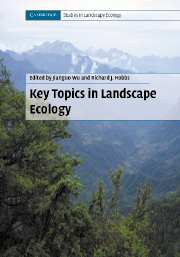Book contents
- Frontmatter
- Contents
- List of contributors
- Preface
- PART I Introduction
- PART II Key topics and perspectives
- 2 Adequate data of known accuracy are critical to advancing the field of landscape ecology
- 3 Landscape pattern analysis: key issues and challenges
- 4 Spatial heterogeneity and ecosystem processes
- 5 Landscape heterogeneity and metapopulation dynamics
- 6 Determining pattern–process relationships in heterogeneous landscapes
- 7 Scale and scaling: a cross-disciplinary perspective
- 8 Optimization of landscape pattern
- 9 Advances in detecting landscape changes at multiple scales: examples from northern Australia
- 10 The preoccupation of landscape research with land use and land cover
- 11 Applying landscape-ecological principles to regional conservation: the WildCountry Project in Australia
- 12 Using landscape ecology to make sense of Australia's last frontier
- 13 Transferring ecological knowledge to landscape planning: a design method for robust corridors
- 14 Integrative landscape research: facts and challenges
- PART III Synthesis
- Index
- References
3 - Landscape pattern analysis: key issues and challenges
Published online by Cambridge University Press: 12 January 2010
- Frontmatter
- Contents
- List of contributors
- Preface
- PART I Introduction
- PART II Key topics and perspectives
- 2 Adequate data of known accuracy are critical to advancing the field of landscape ecology
- 3 Landscape pattern analysis: key issues and challenges
- 4 Spatial heterogeneity and ecosystem processes
- 5 Landscape heterogeneity and metapopulation dynamics
- 6 Determining pattern–process relationships in heterogeneous landscapes
- 7 Scale and scaling: a cross-disciplinary perspective
- 8 Optimization of landscape pattern
- 9 Advances in detecting landscape changes at multiple scales: examples from northern Australia
- 10 The preoccupation of landscape research with land use and land cover
- 11 Applying landscape-ecological principles to regional conservation: the WildCountry Project in Australia
- 12 Using landscape ecology to make sense of Australia's last frontier
- 13 Transferring ecological knowledge to landscape planning: a design method for robust corridors
- 14 Integrative landscape research: facts and challenges
- PART III Synthesis
- Index
- References
Summary
Introduction
Landscape pattern analysis (LPA) has been a major part of landscape ecological research for the last two decades (Romme 1982, O'Neill et al. 1988, Turner 1989, 1990, Turner and Gardner 1991, Pickett and Cadenasso 1995, Gustafson 1998, Wu and Hobbs 2002). The ultimate goal of LPA is to link spatial patterns to ecological processes at different scales. The importance of LPA lies in the needs to: (1) monitor, quantify, and project the change of a given landscape; (2) compare and contrast patterns between different landscapes; and (3) help understand processes underlying observed patterns, so that landscape dynamics may be better understood and predicted (Turner et al. 2001, Wu 2004). Thus, appropriate and effective use of LPA methods is vital to the development of landscape ecology.
After two decades of rapid development, landscape ecology has begun to mature. However, many problems still persist in the application of LPA (Li and Reynolds 1995, Tischendorf 2001, Fortin et al. 2003, Li and Wu 2004). Li and Wu (2004) have called for a serious rethinking of why and how landscape pattern analysis should be used, with an intent to discourage the rampant and blind use of LPA methods. They argued that theoretical guidance should be sought in the practice of LPA. Fortin et al. (2003) stated that methodological developments often undergo four phases: (1) the introduction phase with key papers describing a new methodology, (2) the testing phase with many papers applying the new methodology, (3) the critical review phase with limitations of the methodology identified and with rethinking of its fundamental purposes, assumptions, and formulations, and (4) the standardization phase with the most effective methods being selected as the norm.
- Type
- Chapter
- Information
- Key Topics in Landscape Ecology , pp. 39 - 61Publisher: Cambridge University PressPrint publication year: 2007
References
- 25
- Cited by

